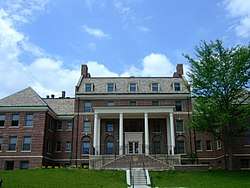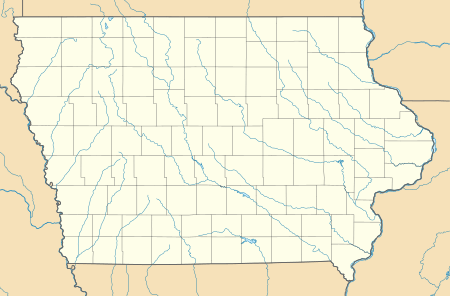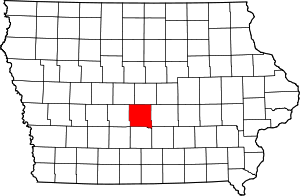Methodist Deaconess Institute—Esther Hall
The Methodist Deaconess Institute—Esther Hall, also known as Hawthorn Hill Apartments, is a historic building located in Des Moines, Iowa, United States. This building has been known by a variety of titles. They include the Bible Training School, Women's Foreign Missionary Society; Women's Home Missionary Society-Bible Training School; Iowa National Bible Training School; Iowa National Esther Hall & Bidwell Deaconess Home; Hawthorn Hill; and Chestnut Hill.[2] The Women's Home Missionary Society of the Methodist Episcopal Church established a Des Moines affiliate in 1896. Part of their responsibilities was to oversee the work of deaconesses of the church. At about the same time a Bible training school was established at Iowa Methodist Hospital's School of Nursing.
Methodist Deaconess Institute—Esther Hall | |
 | |
  | |
| Location | 921 Pleasant St. Des Moines, Iowa |
|---|---|
| Coordinates | 41°35′20.9″N 93°37′49.8″W |
| Area | less than one acre |
| Built | 1922 |
| Built by | Arthur Neumann and Sons |
| Architect | Proudfoot, Bird and Rawson |
| Architectural style | Colonial Revival |
| NRHP reference No. | 09000067[1] |
| Added to NRHP | March 4, 2009 |
This building was constructed in 1922 to house those programs, which trained Methodist women as social workers, missionaries, and deaconesses. It contained dormitories, lecture, science and recreation rooms, and a chapel. Its function expanded in 1925 as a residence for young career women. The Bible training program was phased out during the Great Depression. The facility became co-ed in 1974 and closed in 1976. It reopened in 1978 before housing a multi-ministry human service agency. It ceased as a residential facility in 1995. In 2008 it became a low- and moderate-income apartment building. The building was listed on the National Register of Historic Places in 2009.[1]
The brick Colonial Revival structure was designed by the prominent Des Moines architectural firm of Proudfoot, Bird and Rawson, and it was built by Arthur Neumann and Sons. The 3½-story main block is flanked by two-story wings that forms an "H." A two-story addition was built onto the east wing sometime before 1941. Both the main block and the wings were built over a raised basement. The roof on the west wings is gabled on the north end and hipped on the south, while the east wing has a hip roof. The main block features gabled ends and a two-story front porch that features classical columns and a shed roof. A single-story addition from 1959 has been removed.[2]
References
- "National Register Information System". National Register of Historic Places. National Park Service. March 13, 2009.
- William C. Page. "Methodist Deaconess Institute—Esther Hall". National Park Service. Retrieved 2017-10-23. with photo(s)
